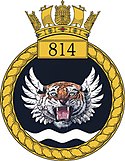814 Naval Air Squadron
| 814 Naval Air Squadron | |
|---|---|

814 NAS badge
|
|
| Active | 1938–1942 1944–1970 1973–2000 2001–Present |
| Country |
|
| Branch | Fleet Air Arm of the Royal Navy |
| Type | Ship-based squadron |
| Role | Anti-Submarine Warfare |
| Garrison/HQ | RNAS Culdrose |
| Motto(s) |
In hoc signo vinces (Latin: "In this sign you will conquer") |
| Equipment | Merlin HM.2 |
| Battle honours | Atlantic 1940 |
814 Naval Air Squadron is a squadron of the Royal Navy Fleet Air Arm. It was formed in December 1938 and has been disbanded and reformed several times. Its nickname is "the Flying Tigers", not to be confused with the American Volunteer squadron of WWII.
The squadron was formed on December 1938 as a Torpedo plane Squadron equipped with six Fairey Swordfish aircraft. Originally embarked on HMS Ark Royal, it transferred to HMS Hermes at the outbreak of the Second World War. HMS Hermes helped search for the Graf Spee and taking part in the Battle of Dakar, damaging the French battleship Richelieu on 8 July 1940. HMS Hermes travelled to the Indian Ocean December 1940, providing support for the land forces in British Somaliland and capturing 5 enemy merchant ships. In May 1941 the squadron provided support to the Royal Air Force in Iraq and later providing convoy protection in the Indian Ocean. In April 1942, while the squadron was ashore, HMS Hermes was sunk by Japanese aircraft off Ceylon and 814 subsequently disbanded at Katukurunda in December. The squadron was reformed in July 1944, equipped with Fairey Barracudas, to embark on HMS Venerable and headed to the Far East for patrols, although seeing no action.
In post-war years, the squadron was equipped with the Fairey Firefly, Grumman Avenger and Fairey Gannet aircraft for anti-submarine warfare onboard HMS Vengeance, receiving the Boyd Trophy for its high standard of operational efficiency in 1951. In 1960 the Squadron was equipped with its first helicopter, the Westland Whirlwind HAS.7, later replaced with the Westland Wessex HAS.1. The Wessex HAS.3 was introduced in 1967, giving the squadron its first radar-equipped helicopter. During this time, the squadron was embarked on HMS Victorious and HMS Hermes to patrol east of the Suez. It was disbanded in July 1970.
...
Wikipedia
